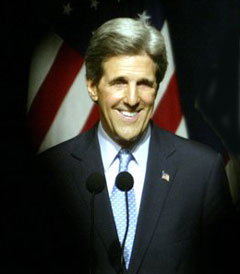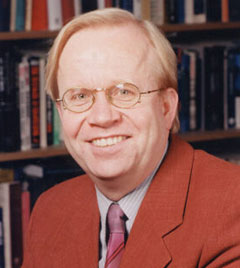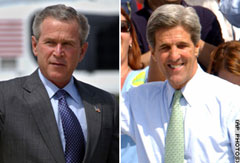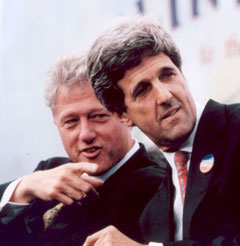|
| |
|
Since 1988, Presidential Election Forecast Model Picks Popular Vote Winner Despite mediocre approval ratings and below average economic growth, President George W. Bush won a second term in the White House as correctly predicted in July by the "time-for-change" forecasting model developed by political scientist Alan Abramowitz. The model has correctly predicted the popular vote winner in every presidential election since 1988. Dec. 3, 2004 |
|
|
Emory Experts Available for Comment on Arafat Emory faculty whose research focuses on the Middle East are available to discuss the death and legacy of Yasser Arafat and what might be next for the region. Nov. 11, 2004 |
|
|
Gay Marriage Referenda Did Not Affect Voter Turnout An analysis by Emory political scientist Alan Abramowitz of voter turnout in each state during the presidential election indicates that the presence of gay marriage referenda on the ballot had no impact on turnout levels. Nov. 9, 2004 |
|
|
Analysis Shows Bush Made Largest Gains Among Less Religious Emory political scientist Alan Abramowitz says that President Bush made gains across the board among voters, regardless of their degree of religious commitment, but that he made his largest gains among less religious voters. Nov. 9, 2004 |
|
|
Merle Black Notes Historic Election Feature "The truly historic feature of the 2004 elections is that this is the first time since the late 1920s that Republicans have held the White House and both houses of Congress in two consecutive elections," says Merle Black. "You have to go back to the days of Herbert Hoover to see a similar result." Black is an expert on national politics and political parties. He, along with his twin brother Earl, is the foremost authority on politics in the South, particularly the rise of the Republican Party. He can be reached at 404-727-6570 or merle.black@emory.edu. Nov. 3, 2004 |
|
|
After the Election: Emory Experts Can Discuss Moving On The 2004 presidential election has been one of the most heated in decades. The electorate has never been so divided with a nearly 50-50 split, so half of voters will be disappointed with the outcome of the election. Emory faculty members are available to discuss various aspects of life in the United States after the election. Nov. 2, 2004 |
|
|
Poll Analysis Finds Presidential Race Still Tight An analysis of the most recent national polls by Emory political scientist and national elections expert Alan Abramowitz finds the Presidential race too close to call heading into the final weekend of the campaign. Oct. 28, 2004 |
|
|
Election Preview Offered at Forum Three of the nation's most distinguished political scientists offered their insight into the 2004 presidential election, national politics and current voter trends during a forum on "Presidential Elections in an Age of Uncertainty" hosted by Emory University Oct. 26 at the Atlanta History Center. Oct. 28, 2004 |
|
Mirroring national trends among college-age youth, a survey conducted this semester by Emory political science professor Alan Abramowitz indicates that Emory students are much more politically engaged this year than they were two years ago. Oct. 7, 2004 |
|
|
Emory Experts Offer Debate Analysis Emory University experts are available for commentary and analysis of the upcoming debates between President George W. Bush and Sen. John Kerry, and between Vice President Dick Cheney and Sen. John Edwards. Sept. 24, 2004 |
|
|
Debates Could Swing Election, Says Emory's Abramowitz The debates this year will undoubtedly play a crucial role in determining the outcome of the election, and the first debate should spark fireworks over Iraq and the war on terrorism, says political scientist Alan Abramowitz, an expert on national elections and polling. Sept. 24, 2004 |
|
|
Bush, Kerry Have Much to Gain, Lose in Debates President George W. Bush and Sen. John Kerry will need to not only strategically attack each other's policies in the upcoming debates, but also avoid a common pitfall of reinforcing negative perceptions voters may have of them, says William Newnam, associate director of forensics and an expert on debate strategy. Sept. 24, 2004 |
|
|
Kerry Needs Mannerisms Makeover, Says Emory's Westen As the presidential debates approach, Sen. John Kerry's campaign continues to ignore the subtle interpersonal and linguistic nuances that people unconsciously register in deciding which candidate they would rather have in office for the next four years, says Emory psychologist Drew Westen. Sept. 24, 2004 |
|
|
Potential Conflicts Exist Between e-Voting, Law In this year's horse race of a presidential election, voting and election administration errors could swing the outcome, and in the case of electronic voting, the lack of a paper trail may leave existing election recount laws out of sync with the reality of the new technology, says Emory election law expert Michael Kang. Sept. 16, 2004 |
|
|
National Poll Analysis Raises Questions About Bush Lead Although the latest Gallup Poll shows President George W. Bush ahead of Sen. John Kerry, an analysis of the poll by Emory University political scientist Alan Abramowitz, based on the results of other recent national surveys, indicates that Kerry may actually be ahead. Sept. 7, 2004 |
|
|
Education Levels and Ideology May Help Drive Partisanship The staunch party loyalty of American voters is driven more by ideology than the social identities that drove the preferences of previous generations, according to research by Emory political scientist Alan Abramowitz. The result has been a realignment of party loyalty in the United States in recent decades that is helping to drive partisanship in national politics, he says. Sept. 1, 2004 |
|
|
Course Explores Politics as Theater As Republicans and Democrats go full throttle against each other to win the hearts of American voters, Emory students in the course "Why all the Controversy? Rhetoric, Culture and the 2004 Election" are paying close attention to the drama, and analyzing the "scripts" each party follows to get across its messages. Aug. 31, 2004 |
|
To win an election, a candidate must be able to read people's emotions and translate issues into feelings that motivate voters – a challenge so far for Sen. John Kerry's campaign, says Emory psychologist Drew Westen. The campaign has had difficulty finding its emotional compass, he says, and needs to increase its "emotional intelligence" to connect with voters. Aug. 27, 2004 |
|
No matter who is elected in November, U.S.-European relations are unlikely to improve in the near future, says Christian Tuschhoff, an expert on international politics at Emory. What divides America from its European allies is a fundamental difference in the way foreign policy is approached. Aug. 24, 2004 |
|
Despite mediocre approval ratings and below average economic growth, President George W. Bush has a good chance of winning a second term in the White House according to the "time-for-change" forecasting model used by Emory political scientist Alan Abramowitz. The forecasting model has correctly predicted the popular vote winner in every presidential election since 1988. Aug. 6, 2004 |
|
|
Emory Experts Weigh in on Kerry-Edwards Ticket Emory political scientist Merle Black says John Edwards will give a boost to Democratic Senate candidates across the South. Emory psychologist Drew Westen cheers the addition of Edwards' charisma to the Kerry campaign. Political scientist Alan Abramowitz says Kerry has added an effective campaigner and strong contrast to Dick Cheney to his ticket. July 6, 2004 |
|
|
Emory Experts Address Iraqi Sovereignty International security and legal experts at Emory are available to discuss issues surrounding the handover of sovereignty to Iraq. June 17, 2004 |
|
As former President Bill Clinton embarks on a tour to stump for his "My Life" memoirs and campaign for presumed Democratic presidential nominee John Kerry, Emory psychologist Drew Westen says Kerry should take advantage of Clinton's charisma to help emotionally connect with voters. June 16, 2004 |
|
|
Young Republican Women Take Active Role in Politics To be young, Republican and a woman is an anomaly on many college campuses where most peers lean a little to the left. Although they are in the minority both on campus and nation-wide, female members of Emory's College Republicans say that they have found in the Republican Party a home that reflects their political values: smaller government, strong families, fiscal responsibility, individual empowerment and conservatism on divisive social issues. May 20, 2004 |
|
|
Political Forecasting Looks at Minds of Voters Instead of relying on factors such as history, polling and approval ratings to forecast voter behavior, Emory psychologist Drew Westen developed a political forecasting model that looks at the role of emotions in how people make decisions about political issues and candidates. March 26, 2004 |
|
|
Watch for Mud: Negative Campaigning a Tricky Tool for Candidates Whether it’s military records, WMDs or alleged infidelity, the mud has already started to flow in this year’s presidential campaigns. With negative campaigning a fundamental part of the process, two Emory University professors weigh in on its effectiveness. Feb. 17, 2004 |
|
|
Emory Experts on What's Next for Saddam Hussein The capture of Saddam Hussein by U.S. military forces will have an impact on many arenas, from the political climate within Iraq to President Bush's approval rating to the U.S. presidential race. The possible ramifications-- including how, when and where Saddam should be tried--will be debated in the coming weeks and several Emory experts can weigh in on a number of these questions. Dec. 15, 2003 |
|
|
A Closer Look |
|||
|
|||
Media Resources |
|||
|
|||
Emory in the News |
|||
|
|||
| calendar | directory | employment | search | help | site index | emory home page |





